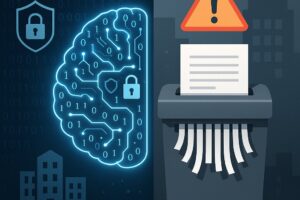Take action to shred old business records before they become a liability.
How to Protect Yourself from ID Theft and Scams This Holiday Season and Beyond
Revised – November 20, 2025
Although it’s the most wonderful time of the year, you still need to guard your identity so you don’t suffer from a not-so-merry Christmas or a less-than-happy Chanukah.
AI Data Security Risks for Medium Businesses: What You Need to Know
Data security in small business is in the cross-hairs of AI. Learn how to leverage the good and defend against the bad in a fast-changing world.
Why should my business shred business documents?
Article updated March 04, 2025
Thieves have many new ways of stealing information from your business. Learn how purging paper and electronic documents can save headaches and money
Navigating Data Privacy Regulations in 2025: A Guide for Businesses
With technology becoming more complicated every day, understanding data privacy regulations for businesses is critical for businesses of all sizes, but especially so for small and medium-sized businesses (SMBs). As technology emboldens criminals, regulations evolve trying to keep up and the volume of data increases, SMBs are often left to adapt on their own. It’s […]
- 1
- 2
- 3
- …
- 9
- Next Page »







